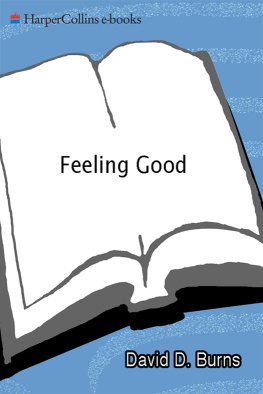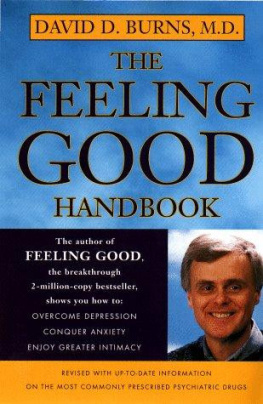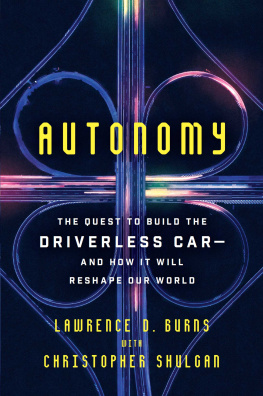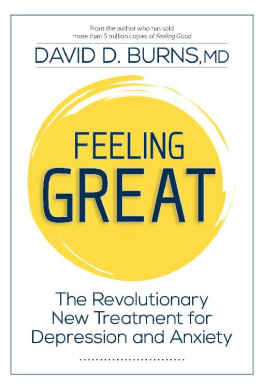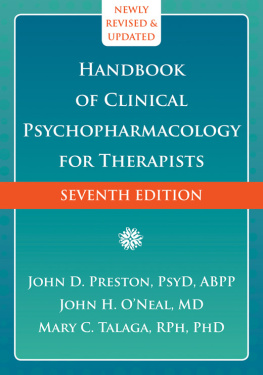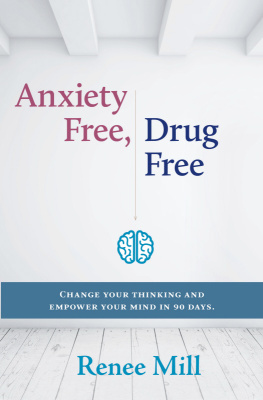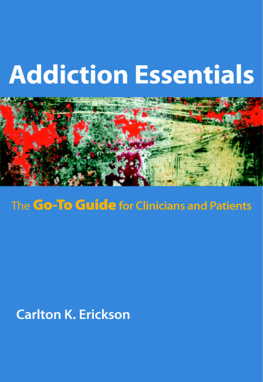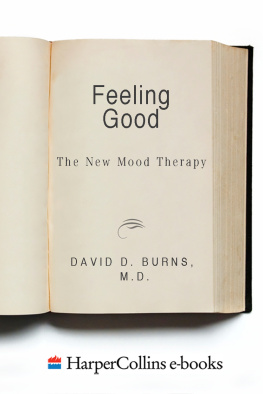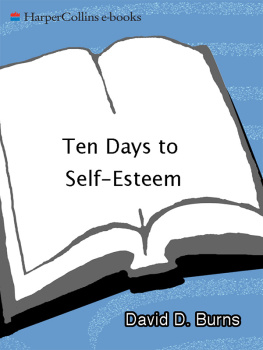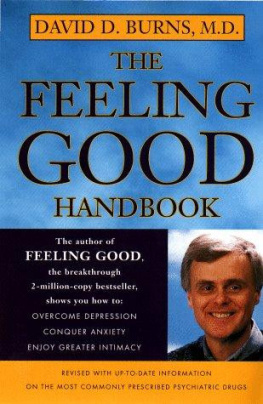Burns - Feeling good: the new mood therapy
Here you can read online Burns - Feeling good: the new mood therapy full text of the book (entire story) in english for free. Download pdf and epub, get meaning, cover and reviews about this ebook. City: Toronto, year: 2010, publisher: HarperCollins;Cnib, genre: Religion. Description of the work, (preface) as well as reviews are available. Best literature library LitArk.com created for fans of good reading and offers a wide selection of genres:
Romance novel
Science fiction
Adventure
Detective
Science
History
Home and family
Prose
Art
Politics
Computer
Non-fiction
Religion
Business
Children
Humor
Choose a favorite category and find really read worthwhile books. Enjoy immersion in the world of imagination, feel the emotions of the characters or learn something new for yourself, make an fascinating discovery.
Feeling good: the new mood therapy: summary, description and annotation
We offer to read an annotation, description, summary or preface (depends on what the author of the book "Feeling good: the new mood therapy" wrote himself). If you haven't found the necessary information about the book — write in the comments, we will try to find it.
Feeling good: the new mood therapy — read online for free the complete book (whole text) full work
Below is the text of the book, divided by pages. System saving the place of the last page read, allows you to conveniently read the book "Feeling good: the new mood therapy" online for free, without having to search again every time where you left off. Put a bookmark, and you can go to the page where you finished reading at any time.
Font size:
Interval:
Bookmark:
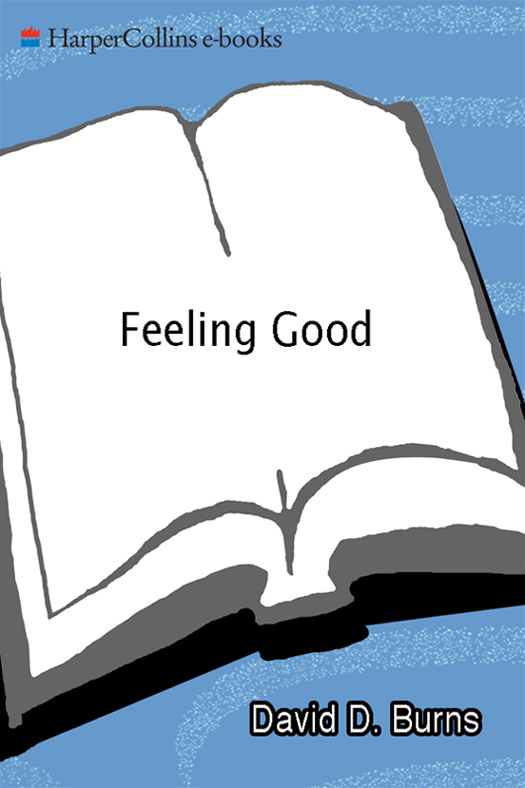
This book is dedicated to Aaron T. Beck, M.D., in admiration of his knowledge and courage and in appreciation of his patience, dedication and empathy.
I have been amazed by the interest in cognitive behavioral therapy that has developed since Feeling Good was first published in 1980. At that time, very few people had heard of cognitive therapy. Since that time, cognitive therapy has caught on in a big way among mental health professionals and the general public as well. In fact, cognitive therapy has become one of the most widely practiced and most intensely researched forms of psychotherapy in the world.
Why such interest in this particular brand of psychotherapy? There are at least three reasons. First, the basic ideas are very down-to-earth and intuitively appealing. Second, many research studies have confirmed that cognitive therapy can be very helpful for individuals suffering depression and anxiety and a number of other common problems as well. In fact, cognitive therapy appears to be at least as helpful as the best antidepressant medications (such as Prozac). And third, many successful self-help books, including my own Feeling Good, have created a strong popular demand for cognitive therapy in the United States and throughout the world as well.
Before I explain some of the exciting new developments, let me briefly explain what cognitive therapy is. A cognition is a thought or perception. In other words, your cognitions are the way you are thinking about things at any moment, including this very moment. These thoughts scroll across your mind automatically and often have a huge impact on how you feel.
For example, right now you are probably having some thoughts and feelings about this book. If you picked this book up because you have been feeling depressed and discouraged, you may be thinking about things in a negative, self-critical way: Im such a loser. Whats wrong with me? Ill never get better. A stupid self-help book like this couldnt possibly help me. I dont have any problem with my thoughts. My problems are real. If you are feeling angry or annoyed you may be thinking: This guy Burns is just a con artist and hes just trying to get rich. He probably doesnt even know what hes talking about. And if you are feeling optimistic and interested you may be thinking: Hey, this is interesting. I may learn something really exciting and helpful. In each case, your thoughts create your feelings.
This example illustrates the powerful principle at the heart of cognitive therapyyour feelings result from the messages you give yourself. In fact, your thoughts often have much more to do with how you feel than what is actually happening in your life.
This isnt a new idea. Nearly two thousand years ago the Greek philosopher, Epictctus, stated that people are disturbed not by things, but by the views we take of them. In the Book of Proverbs (23: 7) in the Old Testament you can find this passage: For as he thinks within himself, so he is. And even Shakespeare expressed a similar idea when he said: for there is nothing either good or bad, but thinking makes it so (Hamlet, Act 2, Scene 2).
Although the idea has been around for ages, most depressed people do not really comprehend it. If you feel depressed, you may think it is because of bad things that have happened to you. You may think you are inferior and destined to be unhappy because you failed in your work or were rejected by someone you loved. You may think your feelings of inadequacy result from some personal defectyou may feel convinced you are not smart enough, successful enough, attractive enough, or talented enough to feel happy and fulfilled. You may think your negative feelings are the result of an unloving or traumatic childhood, or bad genes you inherited, or a chemical or hormonal imbalance of some type. Or you may blame others when you get upset: Its these lousy stupid drivers that tick me off when I drive to work! If it werent for these jerks, Id be having a perfect day! And nearly all depressed people are convinced that they are facing some special, awful truth about themselves and the world and that their terrible feelings are absolutely realistic and inevitable.
Certainly all these ideas contain an important germ of truthbad things do happen, and life beats up on most of us at times. Many people do experience catastrophic losses and confront devastating personal problems. Our genes, hormones, and childhood experiences probably do have an impact on how we think and feel. And other people can be annoying, cruel, or thoughtless. But all these theories about the causes of our bad moods have the tendency to make us victimsbecause we think the causes result from something beyond our control. After all, there is little we can do to change the way people drive at rush hour, or the way we were treated when we were young, or our genes or body chemistry (save taking a pill). In contrast, you can learn to change the way you think about things, and you can also change your basic values and beliefs. And when you do, you will often experience profound and lasting changes in your mood, outlook, and productivity. That, in a nutshell, is what cognitive therapy is all about.
The theory is straightforward and may even seem overly simplebut dont write it off as pop psychology. I think you will discover that cognitive therapy can be surprisingly helpfuleven if you feel pretty skeptical (as I did) when you first learn about it. I have personally conducted more than thirty thousand cognitive therapy sessions with hundreds of depressed and anxious individuals, and I am always surprised about how helpful and powerful this method can be.
The effectiveness of cognitive therapy has been confirmed by many outcome studies by researchers throughout the world during the past two decades. In a recent landmark article entitled Psychotherapy vs. Medication for Depression: Challenging the Conventional Wisdom with Data, Drs. David O. Antonuccio and William G. Danton from the University of Nevada and Dr. Gurland Y. DeNelsky from the Cleveland Clinic reviewed many of the most carefully conducted studies on depression that have been published in scientific journals throughout the world. The studies reviewed compared the antidepressant medications with psychotherapy in the treatment of depression and anxiety. Short-term studies as well as long-term follow-up studies were included in this review. The authors came to a number of startling conclusions that are at odds with the conventional wisdom:
Although depression is conventionally viewed as a medical illness, research studies indicate that genetic influences appear to account for only about 16 percent of depression. For many individuals, life influences appear to be the most important causes.
Drugs are the most common treatment for depression in the United States, and there is a widespread belief, popularized by the media, that drugs are the most effective treatment. However, this opinion is not consistent with the results of many carefully conducted outcome studies during the past twenty years. These studies show that the newer forms of psychotherapy, especially cognitive therapy, can be at least as effective as drugs, and for many patients appear to be more effective. This is good news for individuals who prefer to be treated without medicationsdue to personal preferences or health concerns. It is also good news for the millions of individuals who have not responded adequately to antidepressants after years and years of treatment and who still struggle with depression and anxiety.
Following recovery from depression, patients treated with psychotherapy are more likely to remain undepressed and are significantly less likely to relapse than patients treated with antidepressants alone. This is especially important because of the growing awareness that many people relapse following recovery from depression, especially if they are treated with antidepressant medications alone without any talking therapy.
Next pageFont size:
Interval:
Bookmark:
Similar books «Feeling good: the new mood therapy»
Look at similar books to Feeling good: the new mood therapy. We have selected literature similar in name and meaning in the hope of providing readers with more options to find new, interesting, not yet read works.
Discussion, reviews of the book Feeling good: the new mood therapy and just readers' own opinions. Leave your comments, write what you think about the work, its meaning or the main characters. Specify what exactly you liked and what you didn't like, and why you think so.

